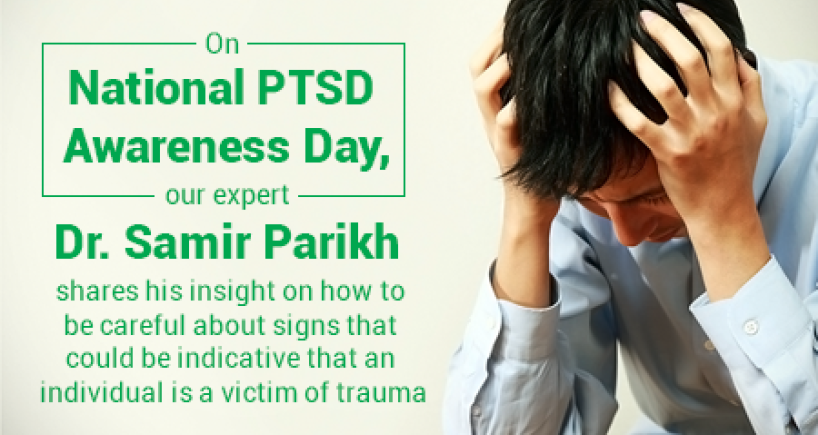
National Ptsd Awareness Day

As we witness the evolving changes in the world around us, the occurrence of potentially traumatic incidents is becoming less uncommon, be it engineered via the medium of a human agency or in the form of a natural phenomenon. What is important to remember is that our lives are comprised of various significant experiences, which could be either positive or negative. While we might enjoy and savor the positive ones, the negative experiences, too, have significant and long lasting effects on our lives. These negative experiences range from daily life struggles to more severe and intense negative experiences which can be rather difficult to deal with. Such traumatic experiences need not be restricted to the consequences of natural disasters, which by themselves are on the rise given the environmental variations being manifested today. Further, they could include any form of abuse, mishap, accident, torture, or any other form of stressor with a long-lasting impact.
Understanding PTSD
A traumatic experience could refer to any severe psychological or physiological stressor which results in damaging effects to an individual. It includes events such as experience of rape, abuse, natural disasters resulting in loss of life and property, to name a few. Such experiences differ in quality from other negative experiences in their capacity to overwhelm one’s ability to cope with what has happened. Abuse (physical, sexual, emotional) is one such significant experience which can result in childhood trauma.
Traumatic experiences can be short-lived, that is, occurring at a single period of time, such as natural disasters, serious accidents, or may occur repeatedly over a long period of time, such as continuous physical or sexual abuse, or neglect. Further, the trauma does not necessarily have to be interpersonal, for example physical, sexual, domestic violence, emotional or verbal abuse, but can also be environmental, including natural disasters, technological disasters or accidents.
Identifying Signs
Abuse and trauma can manifest in both externalizing and internalizing symptoms. That is, the individual may act out, become violent, aggressive, abuse others, or the individual may become withdrawn, depressed and become increasingly fearful and anxious. On the National PTSD Awareness Day, let us look at some signs that could be indicative that an individual is a victim of abuse and resultant trauma-
- Loss of interest in activities
- Frequent unexplained physical complaints such as headaches or stomachaches
- Extreme emotional reactions
- Sleep disturbances
- Difficulty in concentrating
- Increased vigilance or alertness to their environment
- Refusal to go to or to be around specific places or people
- Fear or Anxiety
- Anger and hostility
- Aggression
- Substance abuse
- Self-destructive behavior
- Feelings of isolation
- Poor self esteem
- Feelings of insecurity and mistrust
- Poor interpersonal relationships with peers and family
In addition to these symptoms, extreme and recurring negative experiences or abuse can result in the individual developing a Post-traumatic Stress Disorder (PTSD), exhibiting symptoms, in addition to those mentioned above, such as-
1. Re-experiencing of the traumatic event through intrusive, recurring thoughts or nightmares.
2. Avoiding situations or people who are associated with the traumatic experience.
Furthermore, PTSD could also be characterized by associated behavioural signs (disturbed appetite or sleep patterns, disruptive behaviour, risk-taking attitude and recklessness), arousal/reactive symptoms (hypervigilance and avoidance tendencies), negative cognitions (hopelessness, cognitive distortions, selective amnesia), and dissociative symptoms (visual or sensory intrusions, loss of reality orientation, flashbacks, re-enactment, depersonalization, or derealization).
These cause significant impairment in the person’s lives, affecting functioning in home, work, and other areas as well. Persistence of these symptoms for more than a month, would need professional intervention.
Dealing with PTSD
Dealing with trauma, be it as a witness or a victim, can be extremely challenging, as the nature of a traumatic experience is typically unexpected, uncontrollable and likely to cause harm to self or significant others. Witnessing or experiencing such a traumatic event is thereby likely to lead to feelings of fear and hopelessness. The risk factors which are associated with the development of such a disorder include the severity of the trauma, the individual’s proximity to the traumatic event, and the frequency of the exposure.
Furthermore, factors which could serve a protective role in such situations include the reaction of the caregivers/peers, the presence of a support system, and the resiliency and coping skills of the person. Time is the greatest healer, and all individuals who have been victimized or even witnessed a traumatic event should be allowed to take time to breathe, to let what has happened sink in, and to allow themselves to feel sad, to mourn, or to react to their losses. We should be reassured that it is normal to experience such reactions given the nature of the traumatic incident, and we must not blame ourselves for feeling this way. Further, instead of trying to push it away and evade such topics, we do need an opportunity to discuss our traumatic experiences. Remember, ignoring the way one feels is less likely to let them pass away, instead of allowing yourself to feel what you feel. The persons should be allowed such a time and space wherein they can safely express themselves and gain the support and acceptance from others around them.
Having an idle mind is likely to rekindle distressing thoughts and memories, so it is better to keep yourself as occupied as you can. Also, coping with a sudden or unanticipated traumatic event might require you to take some major life decisions related to your career or family life. However, don’t pressure yourself to make these decisions, give yourself time and space to adjust and cope with the present situation before you plan for the future. In the aftermath of a traumatic experience, it is important to help the survivors build their resilience and develop their coping mechanisms to overcome the traumatic experience. Moreover, the psychological consequences need not be restricted to the victims of the traumatic experience, but can also have an impact on the witnesses, observers, bystanders and the significant others. Remember, certain events are unavoidable, and the damage caused cannot be undone. So do not blame yourself for what happened, and instead focus on what is within your control, which you can actually do to help others and your own physical and psychological well-being.
Finally, we should not hesitate to talk about our feelings for the fear of being reminded of our loss. Talking and sharing your thoughts with others will help you relieve yourself of the burden of the loss. While providing professional psychological support for the victims and their relatives is of undeniable importance, at the same time we should remember to also help the persons build on their inner strengths in order to prepare for the process of recovery. To provide our support, we need not be psychologists, but can simply be patient and understanding, help the person to socialize and relax, and offer your support by being available when the person wants to talk.
Categories
Clear allMeet the doctor

- Mental Health and Behavioural Sciences | Mental Health and Behavioural Sciences | Psychiatry | Clinical Psychology
-
21 Years
-
900



















